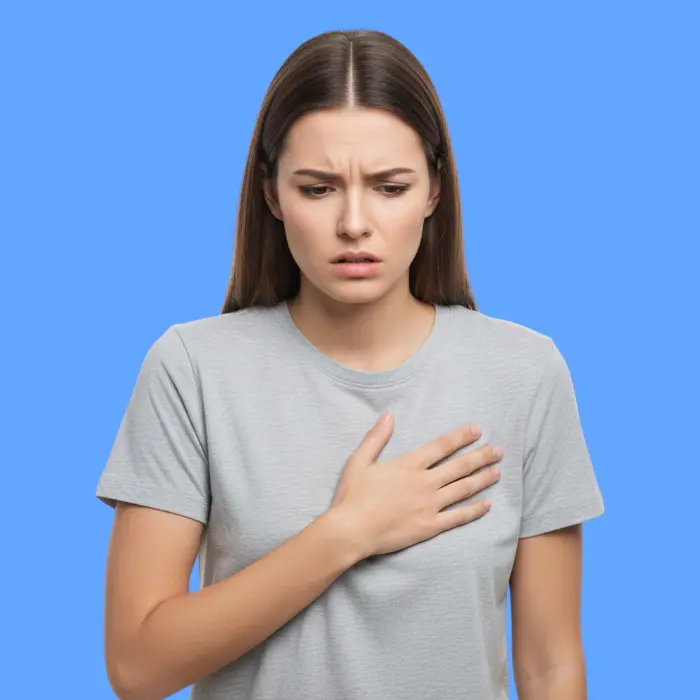what is anxiety?
Anxiety is an unpleasant internal feeling that appears in everyday situations, but it turns into a psychological disorder when it becomes excessive and affects thinking and behavior.
It is accompanied by physical symptoms such as rapid heartbeat or insomnia, and the person may feel an unjustified danger that pushes them to avoid situations that trigger this feeling.
what are the causes of anxiety?
The causes of anxiety vary from person to person depending on psychological and physical conditions. They include:
- Genetics and family history of anxiety or depression.
- Imbalance in neurotransmitters like serotonin and dopamine.
- Exposure to psychological trauma in childhood or loss of a loved one.
- Constant stress at work or in daily life.
- Lack of sleep or excessive caffeine intake.
- Chronic illnesses like diabetes or heart disease.
- Lack of social support or stable relationships.
- Use of medications or stimulants without medical supervision.
what are common anxiety symptoms?

Anxiety symptoms appear both psychologically and physically, and their intensity varies. They include:
- Feeling of fear or constant anticipation.
- Difficulty concentrating or making decisions.
- Rapid heartbeat and shortness of breath.
- Sweating, trembling, or muscle tension.
- Stomach or colon disturbances.
- Insomnia or trouble sleeping.
- Feeling tired without a clear reason.
- Tendency to isolate or avoid social situations.
when should you see a doctor?
It is recommended to see a psychiatrist or specialist when symptoms persist or affect daily life. Situations that require intervention include:
- Anxiety lasting more than two weeks without improvement.
- Anxiety affecting work or social relationships.
- Disturbing physical symptoms like chest pain or shortness of breath.
- Constant thoughts of danger or death.
- Avoiding places or situations due to fear.
- Frequent panic attacks.
- Family history of psychological disorders.
- Thoughts of self-harm or harming others.
what are the treatment options for anxiety?
Anxiety treatment depends on its type and severity and includes multiple options. They include:
- Psychotherapy such as cognitive behavioral therapy (CBT).
- Anti-anxiety or antidepressant medications.
- Relaxation techniques like meditation and deep breathing.
- Group therapy or family support.
- Lifestyle changes like better sleep and nutrition.
- Reducing caffeine and stimulants.
- Regular physical exercise.
- Continuous follow-up with a specialist.
can anxiety be cured?
Yes, anxiety can be cured or significantly controlled, especially with early diagnosis and a proper treatment plan.
Recovery speed depends on several factors, including psychological support, treatment commitment, and a healthy lifestyle. Some may need more time depending on the case.
what are anxiety prevention tips?
Preventing anxiety starts with caring for mental health and avoiding excessive stress. Tips include:
- Maintaining a balanced lifestyle.
- Exercising regularly.
- Getting enough and regular sleep.
- Reducing caffeine and stimulants.
- Expressing emotions and not suppressing them.
- Seeking support from friends or professionals.
- Avoiding isolation and engaging in social activities.
- Managing time and avoiding overload.
what are the possible complications of anxiety?
If untreated, anxiety may lead to complications affecting mental and physical health. They include:
- Depression or mood disorders.
- Poor academic or professional performance.
- Problems in social or family relationships.
- Chronic sleep disorders.
- Addiction to alcohol or drugs.
- Suicidal thoughts or self-harm.
- Physical illnesses like high blood pressure.
- Weakened immunity and increased physical tension.
frequently asked questions about anxiety
Is anxiety a mental illness
Yes, chronic anxiety is a psychological disorder that requires treatment.
Can anxiety cause physical pain?
Yes, such as chest pain, stomach discomfort, or muscle tension.
Does anxiety affect the heart?
It may cause rapid heartbeat or disturbing palpitations.
Does anxiety cause insomnia?
Often, as constant thinking makes it hard to sleep.
article summary
Anxiety is a common psychological disorder that affects thinking, behavior, and physical health. It can appear at any age and requires early diagnosis and treatment to avoid complications.
Prevention starts with caring for mental health, changing lifestyle habits, and seeking support when needed. Symptoms should not be ignored, as treatment is available and effective.